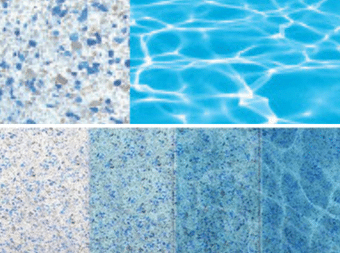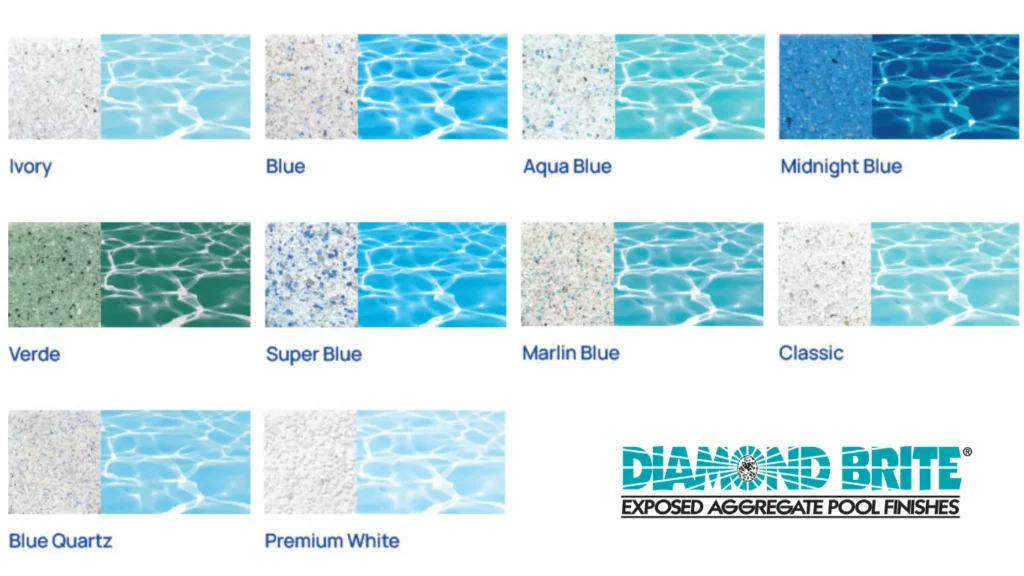When it comes to designing or updating your swimming pool’s surface, few decisions have as big an impact as choosing the right interior finishes. Not only does the finish dramatically influence your pool’s look and feel, but it also plays a critical role in preserving the pool’s structure over time. In this article, we’ll explore why the finish matters so much, how South Florida’s climate shapes your choices, and which materials can stand the test of time. Let’s dive in!

Your pool’s finish isn’t just for looks – it protects the pool’s structure and keeps water where it belongs. A strong finish defends against cracks or leaks, which can save you money in the long run.
It also affects how your pool feels under foot and how the water looks. A smooth, durable surface enhances comfort for everyone, creating a relaxing oasis in your backyard.
In South Florida, heat and humidity put extra stress on your pool’s finish. Hot sun and sudden temperature shifts can cause certain materials to wear out faster or fade over time.
Saltwater systems add another layer of challenge. Salt can speed up corrosion, so choosing a finish that resists these effects is key. By picking the right material, you’ll keep your pool looking beautiful and performing at its best for years to come.
Sometimes, the goal is simple: give your pool a new surface without breaking the bank. That’s when basic plaster, also called Marcite, often comes to mind. But is going “cheap” now the wisest long-term choice?
Marcite is a blend of cement, sand, and calcium carbonate. It was once the go-to option for pool surfaces. Many large home builders used plaster for quick installations. Now, it’s fading in popularity.
Marcite is best for homeowners on a tight budget who want a quick fix. However, it’s usually not the best choice for most South Florida pools. The hidden costs of repairs and early replacement can end up being far more expensive over time.
At Alligator Pools, we’ve seen Marcite crumble under Florida’s sun and salty air. That’s why we specialize in more durable aggregate finishes – like FL Stucco and Diamond Brite. If you want a finish that lasts and looks great, let us guide you to a better solution.

Aggregate finishes are quickly becoming the go-to choice for homeowners who want a pool surface that combines durability, aesthetic appeal, and comfort underfoot. By mixing quartz, pebbles, or small stones into a plaster-like base, aggregate finishes deliver a uniquely textured look that can handle the rigors of South Florida’s climate – heat, humidity, and all.
At their core, aggregate finishes mix natural particles (like quartz or pebbles) with a cement-based binder. This blend is then applied to the pool shell. You’ll often see two main varieties:
These surfaces hide minor imperfections well and reflect light in subtle ways, giving your pool a sparkling, inviting appearance. Plus, their slightly irregular texture can help mask small scratches or stains that might stand out on basic plaster.
South Florida’s high humidity, salt-laden air, and powerful sunshine can shorten the life of some finishes. Aggregate, however, fares exceptionally well in these conditions. The tightly bound stone or quartz particles resist micro-cracking and fading, helping your pool maintain its showroom-ready look for years to come. For saltwater pools, these finishes are also less susceptible to corrosion compared to cheaper alternatives, making them an excellent long-term investment.
Fiberglass resurfacing uses a gel coat or a prefabricated shell to create a sleek, algae-resistant surface. It can be less work to maintain than standard plaster, which appeals to busy pool owners. But when your pool has a unique size or shape – or you want a custom look – traditional finishes like aggregate often provide more flexibility and consistent results.
Pros:
Cons:
Before you invest in fiberglass resurfacing, be sure to compare it to tried-and-true finishes. Alligator Pools specializes in solutions that stand the test of time – so you can enjoy your pool without worry.
If you’re looking for a pool finish that blends striking beauty with lasting strength, pebble finishes should be on your radar. By blending small stones or aggregates into the surface, you get a pool that stands out. Many homeowners love the way pebble finishes add a natural feel that complements outdoor landscapes.
Pebble Tec pool resurfacing has become famous for combining upscale looks with strong durability. The small pebbles deliver a one-of-a-kind texture that feels organic but looks elegant. Whether you choose Pebble Tec or another pebble-based brand, you’ll enjoy a surface known to resist fading, chipping, and everyday wear.
Pros:
Cons:
Pebble finishes are a great option if you want a high-end look without going all-in on tile. Thanks to their natural vibe and tough makeup, they’re perfect for homeowners who love unique textures and want a finish that stands the test of time. If you want guidance on pebble surfaces – whether it’s for a pool renovation or a fresh pool refinishing – the experts at Alligator Pools can help steer you toward the ideal solution. Reach out today to explore your options and get started on a pool you’ll enjoy for years.
Looking for a pool finish that feels like a work of art? All-glass tile might be the answer. Instead of using plaster, aggregate, or pebble, the entire pool is covered in tiny glass or porcelain tiles. These tiles come in endless colors and designs, creating a pool that looks stunning in any light. While the beauty is hard to beat, the cost and installation time can be significant.
An all-tile pool is one of the most expensive pool resurfacing finishes on the market. The bright side is it delivers unmatched visual impact and can be styled to fit almost any theme. Additionally, they can last upwards of 30 years! Your only real deterioration will come from broken tiles or grout eroded by your pool’s chemicals. The flipside is that you’ll pay more, a LOT more! If you’re aiming for that big wow factor or looking for the most durable resurfacing option, all-glass tile might be worth the price.
All-glass tile pools show up in luxury settings or properties with a strong focus on design. From exotic-themed backyards to sleek architectural features, these pools become a statement piece. Just remember, specialized labor is required, and installation can take longer than other options. If you’re craving a pool that makes guests say “wow,” and you’re prepared for a higher investment, all-glass tile can truly shine. If you’re unsure whether it’s the right path, Alligator Pools is here to guide you – every step of the way.
Choosing the right pool finish can feel overwhelming, but it doesn’t have to be. When you break it down into simple factors, you’ll find the perfect match for your style, budget, and long-term goals. Whether you want the budget-friendly option of basic plaster, or the added shine of Diamond Brite, or even the timeless look of an all-tile pool, taking time to evaluate each element can save you headaches later.
By carefully comparing different pool finishes—like basic plaster, aggregate blends, and all-tile—you can find the perfect balance between budget, aesthetics, and long-term durability. However, if your existing pool structure is already showing signs of damage or leaks, it’s crucial to address those issues first. Our pool repair professionals can diagnose and fix any underlying problems, ensuring you have a solid foundation before applying a new finish.
Below are the key areas to think about when making your decision:
Balancing immediate costs with future upkeep often leads to better decisions in the long run. While choosing a lower-priced option might seem smart at first, you could face repairs sooner, driving up the total expense. On the flip side, a more premium finish like all-tile may last longer but has a bigger initial price tag. If you’re unsure, Alligator Pools is here to help you find the sweet spot between cost, looks, and performance – so you can enjoy a pool that fits your budget and style for years.
Keeping your pool looking and feeling its best takes a bit of planning. Different finishes require different care routines, but the right approach can extend your pool’s lifespan and protect your investment. Below is what you need to know for each type of finish.
Once your pool has been resurfaced, a consistent maintenance routine will preserve that fresh look and extend the life of your investment. From regular brushing to careful water chemistry management, these small steps can help prevent algae growth and unsightly staining. If you’d rather leave the upkeep to the pros, our pool cleaning services provide weekly or bi-weekly visits, giving you peace of mind and a backyard oasis that’s always ready for a swim.
If you need a hand with ongoing pool care or aren’t sure how best to maintain your new finish, Alligator Pools is here to help. We can design a maintenance plan to protect your pool refinishing investment, ensuring your backyard oasis stays beautiful year-round.
Aggregate (e.g., Diamond Brite, Florida Stucco) and pebble finishes (e.g., Pebble Tec) handle South Florida’s sun, humidity, and salt exposure extremely well. All-glass tile is also very durable but comes with higher costs and specialized installation requirements.
Aggregate and pebble finishes tend to resist salt-induced corrosion better than plaster or fiberglass. Salt can degrade some surfaces faster, so if you have a saltwater pool, these robust finishes often deliver the best long-term results.
Basic plaster (Marcite) may need replacement within 5 years, while aggregate or pebble finishes can last 7–15 years with proper care. Fiberglass can go 15+ years, and all-glass tile pools can last upwards of 30 years if maintained properly.
Plaster is prone to staining and may require acid washes. Aggregate and pebble finishes need routine brushing and balanced water chemistry but are generally lower maintenance. Fiberglass requires gentler cleaning methods, and all-tile finishes need careful grout upkeep and proper pH control.
Costs depend on the material type, pool size, labor complexity, color of your material selection and brand choice. Cheaper finishes can lead to higher repair bills later, whereas premium finishes cost more initially but often last longer and minimize future expenses.
It’s generally not recommended. Installing finishes like aggregate, pebble, or all-tile requires professional skills, and mistakes can be costly. We also recommend using a licensed Florida pool contractor like Alligator Pools. For most homeowners, hiring experienced pros ensures a smoother process and better long-term results.